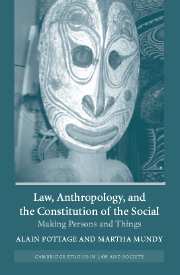Book contents
- Frontmatter
- Contents
- Notes on contributors
- 1 Introduction: the fabrication of persons and things
- 2 Res Religiosae: on the categories of religion and commerce in Roman law
- 3 Scientific objects and legal objectivity
- 4 Legal fabrications and the case of ‘cultural property’
- 5 Ownership or office? A debate in Islamic Hanafite jurisprudence over the nature of the military ‘fief’, from the Mamluks to the Ottomans
- 6 Gedik: a bundle of rights and obligations for Istanbul artisans and traders, 1750–1840
- 7 Losing (out on) intellectual resources
- 8 Re-visualising attachment: an anthropological perspective on persons and property forms
- 9 Our original inheritance
- Bibliography
- Index
4 - Legal fabrications and the case of ‘cultural property’
Published online by Cambridge University Press: 12 July 2009
- Frontmatter
- Contents
- Notes on contributors
- 1 Introduction: the fabrication of persons and things
- 2 Res Religiosae: on the categories of religion and commerce in Roman law
- 3 Scientific objects and legal objectivity
- 4 Legal fabrications and the case of ‘cultural property’
- 5 Ownership or office? A debate in Islamic Hanafite jurisprudence over the nature of the military ‘fief’, from the Mamluks to the Ottomans
- 6 Gedik: a bundle of rights and obligations for Istanbul artisans and traders, 1750–1840
- 7 Losing (out on) intellectual resources
- 8 Re-visualising attachment: an anthropological perspective on persons and property forms
- 9 Our original inheritance
- Bibliography
- Index
Summary
Why have scholars in a range of disciplines, far from letting go of law, returned to it, in some cases with a vengeance? Have not all their disciplinary protocols and presuppositions taught them that law no longer plays the role in human affairs it once did, even as, at the same time, we are surrounded by and engulfed in it? One once took it more or less for granted that the persistence of jural perspectives in social anthropology was a problem, not a good thing, and that the rather legalistic anthropology of Max Gluckman, for example (not that its legalism was appreciated at the time in his own university's Law Faculty), was problematic and needed to be displaced.
But perhaps the intellectual development in motion here is not a re-legalisation of anthropology but an importation of anthropology into the rather peculiar because ancient discipline of law. Yet it is not at all clear what this might mean or how it might be achieved, if at all. An anthropology of legal processes like trials, legal representation, the construction of victims and offenders, sentencing, even the mundane business of bailiffs and police (distress, arrest, sequestration, imprisonment) can be approached anthropologically, in parallel no doubt to sociological and economic approaches to these phenomena. But this is not a reversible relationship so far as law is concerned, if we want to say anything more than that to conduct research in some country you need a permit from a Ministry along with your passport, visa, and so on.
- Type
- Chapter
- Information
- Law, Anthropology, and the Constitution of the SocialMaking Persons and Things, pp. 115 - 141Publisher: Cambridge University PressPrint publication year: 2004
- 18
- Cited by



